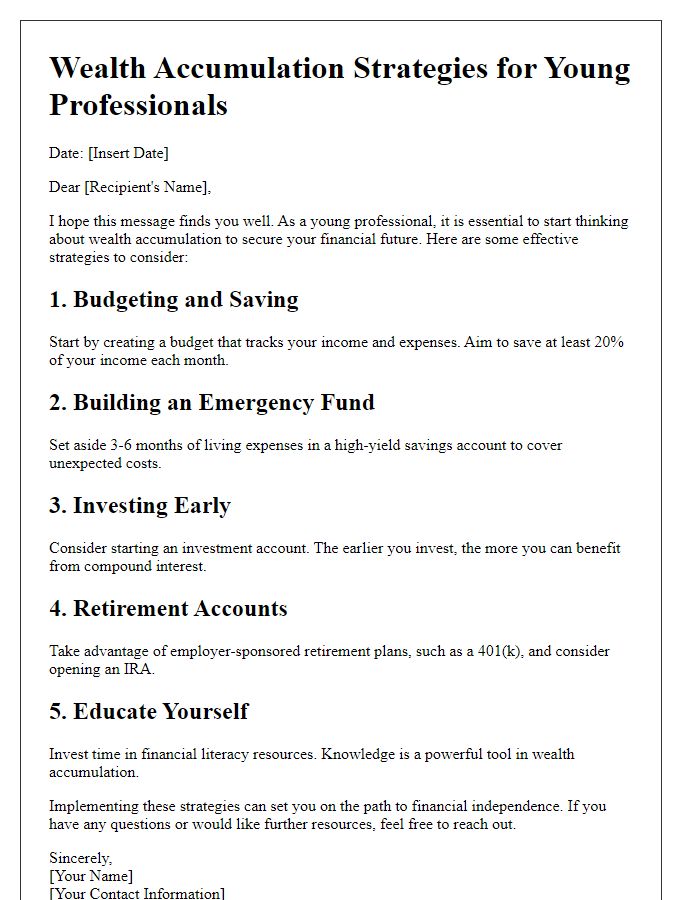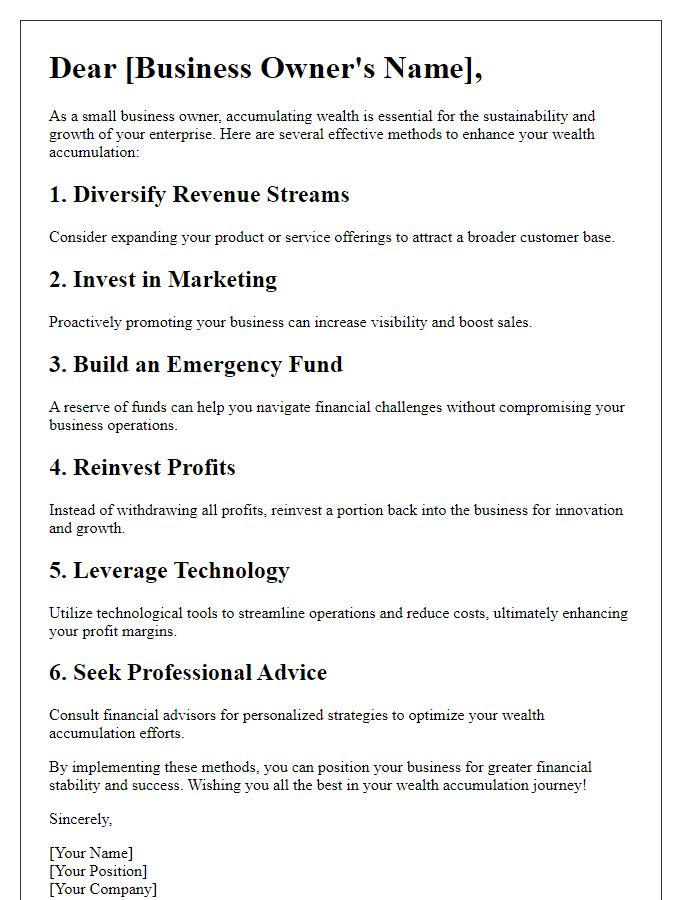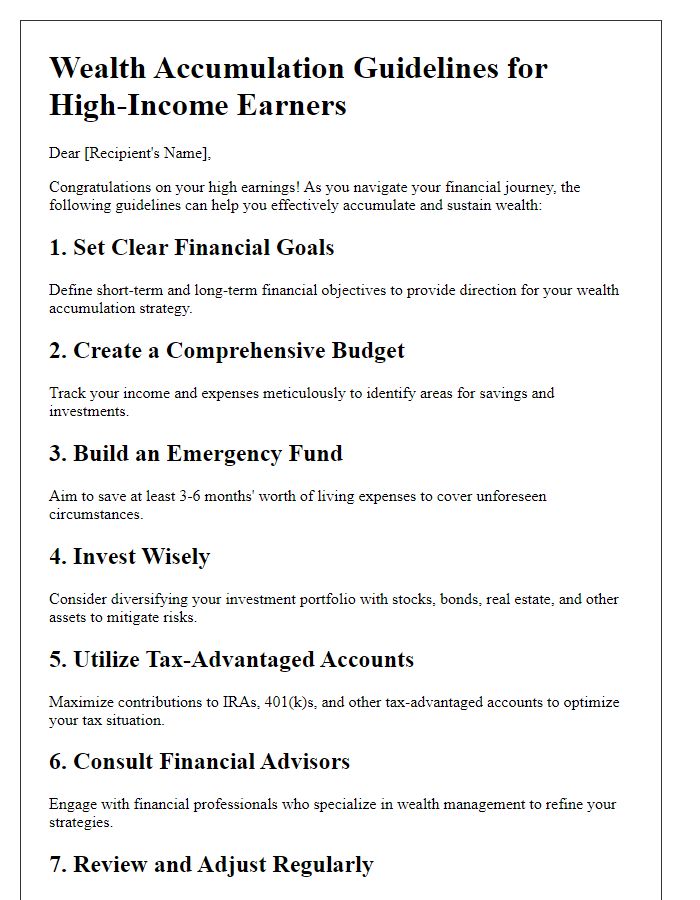Are you ready to unlock the secrets to wealth accumulation? In today's fast-paced financial landscape, understanding effective tactics can set you on the path to financial freedom. From strategic investments to smart budgeting practices, there are countless ways to grow your wealth. Join us as we dive deeper into these powerful strategies that can transform your financial future!

Income Diversification
Income diversification involves spreading financial resources across various income streams to mitigate risk and enhance overall wealth accumulation. Strategies may include investing in real estate properties for rental income, engaging in stock market investments focusing on diverse sectors, and launching side businesses or freelance work to create additional cash flow. Utilizing peer-to-peer lending platforms can also serve as a means to generate passive income while employing high-yield savings accounts for liquid assets can provide immediate financial security. A well-structured portfolio that embraces varying risk levels and time horizons can harness the compounding power of investments for optimal financial growth.
Strategic Budgeting
Strategic budgeting entails a meticulous approach to financial planning, aimed at maximizing wealth accumulation over time. Crafting a detailed budget requires an analysis of monthly income sources, such as salaries or passive income streams, alongside fixed expenses like rent or mortgage payments, utilities, and groceries. Allocating funds to savings and investment goals, including retirement accounts (like 401(k) plans or IRAs) and emergency funds (generally three to six months of living expenses), is crucial. Debt management strategies, such as prioritizing high-interest debts like credit cards, must also be integrated into the budgeting process. Regularly reviewing and adjusting the budget based on changing financial circumstances or economic conditions, such as inflation rates and interest rates, will help maintain momentum toward long-term wealth objectives. Employing tracking tools or apps can enhance visibility over expenditure patterns and facilitate informed financial decisions.
Tax Optimization
Tax optimization strategies can significantly enhance wealth accumulation for individuals and businesses. Techniques such as tax-loss harvesting allow investors to offset capital gains with losses incurred within the same tax year, thereby reducing overall taxable income. Contributions to tax-advantaged accounts, such as 401(k) plans or Individual Retirement Accounts (IRAs), provide immediate tax deductions and the benefit of tax-deferred growth, maximizing long-term investment growth. Utilizing deductions available for mortgage interest, state taxes, and charitable contributions can further reduce a taxpayer's liability. Furthermore, understanding the intricacies of various tax brackets and implementing strategies like income shifting can prevent individuals from progressing to higher tax rates, ultimately preserving more wealth. Consulting with certified tax professionals can ensure compliance with regulations while identifying opportunities tailored to unique financial situations, enhancing overall wealth strategy efficacy.
Asset Allocation
Asset allocation is a crucial strategy in wealth accumulation, involving the distribution of investments across various asset classes, such as equities, fixed income, and real estate. Effective asset allocation can enhance portfolio diversification, potentially reducing risk and maximizing returns over time. Historical data indicates that a balanced allocation might include 60% stocks for growth, 30% bonds for stability, and 10% alternatives like commodities. Regular portfolio rebalancing is essential to maintain the desired risk profile, adjusting investments in response to market fluctuations. Financial advisors often recommend evaluating one's risk tolerance and investment horizon before determining the ideal asset mix, ensuring alignment with long-term financial goals. Emphasizing factors like age, income level, and liquidity needs can further tailor strategies for individual circumstances.
Inflation Awareness
Rising inflation, defined as the sustained increase in the general price level of goods and services, significantly influences wealth accumulation strategies. For instance, the U.S. inflation rate was approximately 6.2% in October 2021, prompting investors to reconsider traditional savings methods. Cash sitting idle in savings accounts, yielding less than 1% interest, can lose purchasing power in an inflationary environment. Real assets such as real estate, commodities like gold (which often see price appreciation during inflationary periods), and inflation-protected securities (TIPS in the United States) emerge as viable options. Additionally, understanding historical events like the 1970s oil crisis can provide insights into how diversifying investment portfolios can hedge against inflation and enhance long-term wealth growth.
Letter Template For Wealth Accumulation Tactics Samples
Letter template of wealth accumulation strategies for young professionals

Letter template of wealth accumulation methods for small business owners

Letter template of wealth accumulation insights for first-time investors

Letter template of wealth accumulation guidelines for high-income earners










Comments